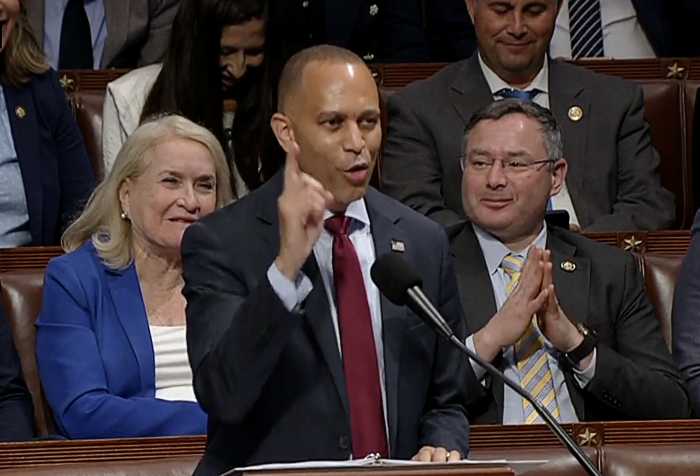Longtime Woodside residents Kathleen Conway and Wilson Esquivell are two of more than 1,300 homeowners in Queens who can now apply for federal assistance, including grants, through the Federal Emergency Management Agency (FEMA) to help recoup damages from the August 8 flooding that destroyed portions of their homes.
Congressmember Joseph Crowley said he made an impassioned phone call to the White House on Friday, August 31, asking President Bush to declare Queens County a federal disaster area, and five hours later, the president made that declaration, which will open up federal funding to flooding victims.
“This declaration will bring real money to real people in Queens to mitigate the effects of the August 8 flooding,” said Crowley, who told a number of residents about the available federal aid in front of Conway’s flood-damaged home on 65th Place and 47th Avenue in Woodside.
“We can’t move our homes, and it’s a health hazard,” said Conway, who said that four feet of water and sewage from the August 8 flooding ruined her basement where her daughter Denise Rueckert and grandchildren lived. “It’s hard enough for people to live today without all these extra expenses, which could have been avoided.”
Under the guidelines for a federal disaster area, Queens residents can apply for non-repayable grants for temporary housing expenses, household repairs, replacement of personal property and essential household items and low-interest loans.
“There’s no cap, no limit on how much money that will be made available,” Crowley said. “It all depends on who applies for the aid.”
In order to receive federal aid, residents must register with FEMA, and make an appointment for an official to come to their home and view the damaged areas. Residents and business owners can register online at www.fema.gov or call 1-800-621-FEMA (3362).
Meanwhile, a Disaster Assistance Service Center opened at the Tzu Chi Foundation, 137-77 Northern Blvd, on Wednesday, September 5 to give residents the opportunity to speak with federal, state city representatives about their flooding problems.
“Register with FEMA first,” said Marianne Jackson, the Federal Coordinating Officer for the Queens disaster. “Registration is essential to begin the recovery process. If you don’t register, you are not even in the system.”
In addition, the relief package includes a hazard mitigation grant program, where federal authorities could provide up to 75 percent of the cost to enact measures that would reduce or prevent similar flooding problems from happening in Queens again. Crowley said that he would be organizing meetings with city, state and federal officials as well as community representatives, to come up with a plan to study the flooding problems and potential solutions.
“This money will help us evaluate the situation, and hopefully come up with a solution so that our people do not have to face this terrible occurrence again,” said Assemblymember Marge Markey, who represents areas in western Queens affected by flooding.
Markey mentioned poor sewage, clogged drains, overdevelopment and an inadequate infrastructure as possible factors in the flooding woes, and continued to call on the city to investigate the causes to determine how to prevent a similar occurrence.































